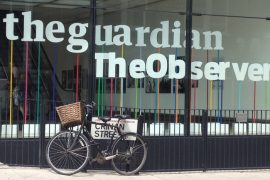One of the more underappreciated institutional pathologies at the Guardian is their glaring lack of self-awareness, in that they not only deny that their coverage of Israel and Jews fuels racism against Jews, but actually fancy themselves uniquely capable of objectively reporting on and analysing (‘real’) antisemitism.
Thus, editors deemed Chris McGreal, whose malign obsession with Israel and ‘Jewish power’ has been documented here for nearly 15 years, worthy of determining ‘if’ there’s been expressions of antisemitism during the anti-Israel protests at college campuses across the US.
In fairness, his piece, (“How pervasive is antisemitism on US campuses? A look at the language of the protests”, May 3) isn’t quite as horrible as other Guardian whitewashes of antisemitism. However, that’s an extremely low bar. Though McGreal finds some antisemitism within the campus encampment protests, his predictable conclusion is that the fear expressed by Jewish students has been way overblown, and that most of the pro-Palestinian protesters ‘don’t have an antisemitic bone in their body’.
McGreal, who focuses most of his piece on the protests at Columbia University in New York City, writes that “it’s hard to deny that there have been antisemitic incidents on the campus, including the targeting of students, probably Jewish, called ‘Nazi bitches’ and told to ‘-go back to Poland’. He then notes that “a female Jewish student described a masked pro-Palestinian demonstrator confronting her as she walked across campus one evening” who “menacingly demanded to know if she was a Zionist” after which “she stopped wearing a Star of David necklace.”
He doesn’t, however, explain the broader problem faced by Jewish students at Columbia, and on other campuses, such as UCLA: that the encampments have forbidden Jews – unless they’re anti-Zionists – from entering.
This looks like a sitcom, but it's not. A human blockade of hundreds at Columbia approaches a small group of Jewish students while saying "one step forward… push them out of the camp" in perfect unison. This is a Columbia tent encampment pic.twitter.com/QvBuzP5QJH
— Sahar Tartak🇮🇱🇺🇸 (@sahar_tartak) April 22, 2024
Later, McGreal writes that “Gil Zussman, a professor of electrical engineering and member of Columbia’s antisemitism taskforce, said other students had had similar experiences of being threatened or verbally attacked.”, before concluding that “instances of threatening behaviour directed at individuals appear to have been relatively isolated”.
Omitted by McGreal is a message sent by a leading rabbi at Columbia to Jewish students on April 22 “strongly” recommending they return home and remain there. In his message, Rabbi Eli Buechler wrote that recent events at the university “have made it clear that Columbia University’s Public Safety and the NYPD cannot guarantee Jewish students’ safety.”
Jews, in fact, have faced widespread harassment, threats, intimidation and violence at Columbia – and at other campuses.
Columbia University:
Here's 7 minutes of footage from @Columbia University showing:
➡️ Threats against Jews
➡️ Harassment and demonization of Zionists (we know they mean Jews)
➡️ Calls for violence, including genocide against Jews
➡️ Actual violence against an IsraeliI'll remind you that @AOC… pic.twitter.com/pvg8pOxPFr
— Aviva Klompas (@AvivaKlompas) April 29, 2024
UCLA:
Note the words on the truck at 40 seconds into the clip. https://t.co/QJg5XOWvbE
— CAMERA UK (@CAMERAorgUK) May 2, 2024
UCLA:
“Are you a Zionist?”
“Of course I am.”
“So, you can’t enter.”
“I’m not allowed to enter the library, while paying tuition here?”pic.twitter.com/fhH9pvNbXH— Emily Schrader – אמילי שריידר امیلی شریدر (@emilykschrader) April 30, 2024
George Washington University:
"We reject the terms that our imperialist, colonialist overlords have chosen for us. We name shit for ourselves. And we do it to honor our martyrs."
The pro-terror mob declares that it has renamed the Yard at George Washington University to "Martyrs Square."
They want to name… pic.twitter.com/eLDOtfYHxI
— Aviva Klompas (@AvivaKlompas) May 4, 2024
MIT
Today at @MIT, just steps from the Hillel building, a crowd of students cheers a man praising Ham@s, the PFLP, and the Muslim Brotherhood.
“You can’t support a people who are fighting back and fail to support those who are putting their lives on the line. So when they say all… pic.twitter.com/w6LQdA6LLv
— Talia Khan (@TaliaKhan_MIT) May 2, 2024
Rutgers University
BREAKING: Rutgers SJP calls for the end of Israel
"Israel must fall. Free our prisoners, free them all."
A student yells this as a poster of Ahmad Sa'adat is shown behind him. Sa'adat is a Palestinian militant and Secretary-General of the Popular Front for the Liberation of… pic.twitter.com/8gNnvY0LPZ
— Stu (@thestustustudio) May 1, 2024
University of Pennsylvania:
This is sick. The pro-terror mob at @Penn yell "liar, liar colonizer" at the horrific footage being played of the October 7 atrocities.
These terror-supporting twerps think it's all a game.
🎥 @EYakoby pic.twitter.com/sEDSXn8H1F
— Aviva Klompas (@AvivaKlompas) May 3, 2024
McGreal then reports on the comments by one of the protest leaders, Khymani James, who was seen on video, in January, saying that “Zionists don’t deserve to live”, “be grateful that I’m not just going out and murdering Zionists”, that Zionists, white supremacists and Nazis “are all the same people” because their existence is “antithetical to peace”, and that “I feel very comfortable, very comfortable, calling for those people to die”.
“Zionists don’t deserve to live.”
Meet @KhymaniJames, one of the leaders of @Columbia’s anti-Israel Gaza Solidarity Encampment.
But tell me more how this is peaceful …pic.twitter.com/oHfXXA3rRd
— Arsen Ostrovsky 🎗️ (@Ostrov_A) April 26, 2024
McGreal writes that James apologised for his remarks. But, even leaving aside the moral significance of ‘apologising’ after calling for the murder of most of the world’s Jews, as you can see, it’s a mealy mouthed apology at best.
Read my statement below: pic.twitter.com/0u6mwycAYS
— Khymani James (@KhymaniJames) April 26, 2024
McGreal then claims that James’ annihilationist antisemitic remarks “were widely condemned by pro-Palestinian groups, which said they did not represent the views of the movement”. However, while CUAD and Gaza Solidarity Encampment said James’ words don’t represent their movements, we can’t find any evidence that Columbia Students for Justice in Palestine (SJP) – one of the ‘pro-Palestinian groups’ who organised and led the encampment protests – in any way distanced their group from James’ antisemitism.
This isn’t surprising, given that SJP (both the national group and various campus chapters) has a record of openly supporting terrorism, including the Oct. 7th Massacre, and the fact that the group’s founders, financial patrons and ideological supporters have reportedly been linked to terror organisations such as Hamas, Hizbullah, PIJ, and the PFLP. They also appear to be closely tied to a Hamas-linked group called America Muslims for Palestine (AMP).
Both SJP and AMP are currently being sued in the US by Oct. 7th victims for serving as a “Hamas propaganda arm”.
Turning to protests on other campuses, McGreal later claims that, “so far, the only major act of violence during the nationwide protests has been an attack by supporters of Israel on a Palestine solidarity camp at UCLA.”. That’s not true. As we noted in a complaint to Guardian editors, McGreal omitted an attack on a Jewish female student which caused a head injury – leaving her briefly unconscious.
Jewish student at UCLA beat unconscious by anti-Israel mobs at UCLA.
What a “peaceful encampment” pic.twitter.com/gK1bQKdCFw
— Emily Schrader – אמילי שריידר امیلی شریدر (@emilykschrader) May 1, 2024
Finally, in addition to the pro-terror and antisemitic rhetoric, bullying and violence at the anti-Israel protests that have taken place on campuses, there’s something that’s rarely noted: the absence of even the pretense that protesters support a peaceful resolution to the Israeli-Palestinian conflict or even that they condemn Hamas’s Oct. 7th massacre – the bare minimum that’s necessary for a pro-Palestinian protest movement to be described as moral or liberal.
To those obsessive critics of Israel who continually carry on about how they condemn ‘real’ antisemitism, as opposed to what they frame as the imagined antisemitism which they frame as a cynical attempt by Jews to ‘silence criticism of Israel’, Oct. 7th and its aftermath once and for all put their supposed principles to the test. Those who can’t fully, and without qualification, condemn the most deadly and barbaric antisemitic attack since the Holocaust have proven once and for all that their hatred of Israel is indeed inspired by an animosity towards Jews.





